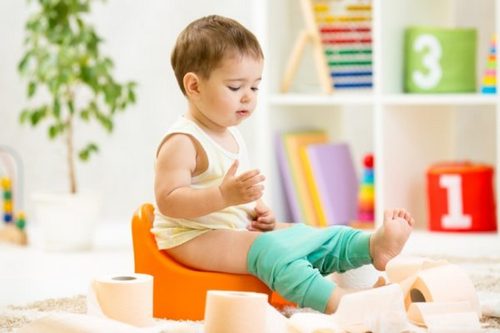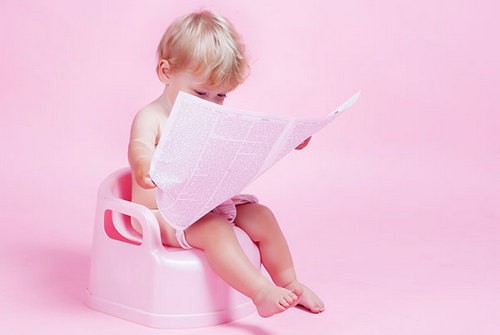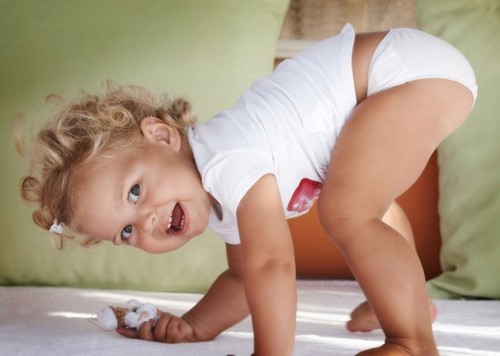Learning to pot is a seemingly uncomplicated task. What could be easier? I bought a pot, introduced the child to him and you’re done. But in fact, very often not everything is so rosy. Often the baby, having familiarized himself with this subject, protests and stubbornly refuses to use it.
How to be a mother if the child does not go to the potty?
First of all, three questions should be answered. Is the baby ripe for this? Why is the child afraid of the pot? How to help him overcome his fear?
At what age do you need to teach a child to potty?
It is impossible to unequivocally answer this question. We can say that it depends on whose point of view the mother will take on this issue. To date, there are three possible answers, they all differ from each other, have a justification and the right to exist. In general, the choice is up to the parents.
Proponents of natural parenthood pose the first point of view. They practice “planting” the crumbs from the first days of his life, and argue that subsequently their babies do not have problems with the pot.
The second option, which is welcomed by older people, our mothers and grandmothers, is a classic of Soviet education. The followers of this trend are sure that as soon as the child learns to sit well on his own, he needs to be introduced to the potty. At the same time, the baby’s age is a little more than six months.
The third group, the most common today, includes modern pediatricians and child psychologists who believe that the child should be taught to the potty at the age when he is able to control his excretory functions. At the same time, they call quite a “solid” age – not earlier than one and a half to two years.
Until the baby learns to control its physiology, potty training can turn into a laborious, nervous process, the result of which with a high degree of probability can be the fear of a pot in a child.
How to determine that the child is ready to walk on the potty?
The kid is easy to teach to the potty when he is ready for it. The child does not want to sit on the pot because he has not matured. The willingness to master such a skill comes individually and does not always depend on age. Therefore, parents in this matter do not need to be guided by the fact that the baby has already turned one and a half years old, or that the neighbor’s kid has long made friends with a pot. Readiness can only be determined by certain signs.
The potty training will pass without problems if the baby has learned:
- to rise, to squat, to bend;
- easy to pick up small items, fold them;
- understand speech;
- pronounce individual words;
- communicate what he needs;
- wake up dry after a day’s sleep;
- feel uncomfortable in wet clothes;
- remove and put on the diaper;
- show or say that he should go to the toilet;
- distinguish between dry and wet.
About the readiness of the child and his diapers say. If they remain dry longer and longer, then the baby has learned to control his bladder.
An important condition for successful development will be the lack of fear of the pot, so you need to act carefully, encouraging and praising the baby. Before starting, it is advisable for mother to study the experience of others, read literature and hear the opinions of modern pediatricians. It is necessary to choose exactly the method that will be effective for a particular baby.

We must not forget that the child is a personality, and an individual approach is needed in his upbringing. The most important thing for parents is to stay calm. The worst thing that can be done in the process of accustoming to the pot is to scold the baby for his failures and not try to understand why he refuses to write in the pot. Patience is the main helper.
What is not worth doing?
Briefly indicate unnecessary actions when accustoming to the pot, they will be as follows:
- untimely start of training;
- formal, technical approach to the process;
- excessive persistence, severity and punishment;
- irregularity and lack of system.
For successful accustoming to the pot, it is important to correctly determine the time that is optimal for a particular baby. If mother decided to wait for a conscious approach to business, then you should not start earlier than the child begins to walk, and even better – not earlier than one and a half years.
If the mother is a supporter of early planting, then you can start as soon as the baby starts to sit well. But in this case, it is necessary to be aware that at such an early age the result will be manifested only in the economy of diapers, and stable skills are not yet possible to achieve, for this crumb it will ripen a little later.
Often, parents do not take into account the crisis of one year and do not understand why a child who did not resist before, now refuses to go to the potty. This phenomenon should not scare – the crisis will end, the baby will grow up and learn.
If the child does not sit on the potty in any way, bends, cries, it is better for mother not to insist and postpone the process of learning for a month or two. Excessive perseverance instead of the expected result can lead to completely opposite consequences.
Returning to this later, mom can try to create a different mood for the baby, replacing the technical process with a game one. It is worth showing how to use the pot using the example of a doll or your favorite soft toy. And, of course, praise the baby. It is very important to encourage him for the fact that he managed to control himself and tell his mother about his needs in time.
Even if the child does not ask for a pot at all, it is necessary to allow him to stay without a diaper during the day. This is necessary so that the baby can notice when bowel movements and urination occur and what sensations accompany these processes. Therefore, it is recommended to start training in the warm season.
We must talk with the crumbs, tell him what happened to him. “You pee (poop)”, you can say “pee” or “aaaa” if the child still does not speak well, so that later he could indicate his desire.
Often a child is afraid to sit on a pot because he is frightened of what he sees. It is very important to reassure him, to praise him, to say that what he has done is right. It happens that the baby wants to touch the contents of the pot. Mom needs to be explained that this cannot be done. It is important not to raise your voice.
If the crumbs did not work, you do not need to scold him and punish him. It is important to respond to this in a positive tone.
In the process of training, you need to choose a middle ground between rigor and encouragement. You can not scold the baby, otherwise the child may stop asking for a pot. But it is also not worth giving praise too vigorously and, especially, giving gifts. This can create a steady need for attention and reduce the ability of self-control. Enough calm praise to mom.
Training requires a system. Starting to do this, mom must be firmly convinced that she is ready and able to devote the necessary time to the process.
Causes of Pot Fear
How to teach a child who is afraid of the pot? First of all, you should understand what caused this reaction. The child refuses to sit on the pot for various reasons.
We should not forget about such a thing as a crisis of one year. A common situation is when a baby up to this age patiently fulfilled the requirements of his mother, but then suddenly the child stopped asking for a pot. Many children annually protest against any actions of their parents, including against attempts to put them on a pot.
Another reason why the child ignores the pot may be a strong passion for the game, during which he simply does not notice what he needs in the toilet and does not control his needs. In this situation, so that the child does not stop writing in the pot in the future, you should never scold him.
The ability to quickly master a pot depends on the gender. Girls learn this easier and faster, but mothers of boys need to be patient.
Speaking about the causes of failures, we recall the haste and untimelyness. Often, the mother is simply in a hurry, focusing not on the baby’s capabilities, but on the environment. Every now and again, relatives and friends talk about the fact that at this age it is high time, and their child does not poop in a pot. And then, for the sake of their ambitions, the parents impose on the baby something that he simply has not ripened and is absolutely not ready to accept. This is a common reason that a child refuses a pot.
The child cries on the pot if afraid. Kids tend to be wary of new items. Maybe the pot was bought recently, and the baby is still not used to it? The cause of fear may be aggressive-persistent behavior of the mother in the process of learning. Often an impressionable child refuses to poop on a pot when he is loudly scolded, that is, the reaction to censure is completely opposite to the one that my mother wanted to receive.
The reason may be physiological – for example, constipation. Hard feces cause pain to the baby, and then the pot will be associated with pain for a long time. In this situation, it is important to determine in time why the child is afraid of the pot and eliminate the cause of constipation. If this is not done, the situation will worsen, and constipation will become a psychological problem.
Failures in this matter can haunt parents in the absence of close emotional contact with the child. The stubborn planting of the baby on the clock without taking into account his desire can lead to the fact that the child will refuse to sit on the potty.
Thinking about what to do if a child is afraid of the pot, mom should think:
- whether she was in a hurry with the deadlines for the start of training;
- whether the baby is used to the pot that they just purchased;
- whether the crumbs have constipation;
- Is the mom’s actions too aggressive and intrusive when familiarizing herself with the potty?
- whether the words and actions of the elders cause the baby’s fear and anxiety.
What to do?
What should parents do if the child becomes afraid of the pot? First of all, I want to recommend mom not to rush. No need to create yourself and a crumb of additional difficulties. If you really want to engage in potty training from a very young age, and you have confidence in your rightness and strength, you can try.
The baby can be planted by the clock, as well as after eating, sleeping, predicting his physiological needs. And you can not do this until he turns one and a half to two years. It will be easier to teach again than to teach after the child has stopped walking on the potty due to inept actions of his parents.
If it so happens that the child is afraid to poop into a pot and does not perceive it at all, it is better to just let the situation go for a while. A baby, like a mother, needs time to calm down. No need to put pressure on him. Persistence in this situation can exacerbate the problem. After a month, you should try again.
You can recommend parents to act visually. A child loves to imitate. Therefore, you can explain to him what the pot is for, you can use the example of a doll, another toy, an older brother or sister, using your example. Even if you do not focus the attention of the baby on this and act unobtrusively, natural observation will prevail.
If the child has ceased to poop into the pot, you can try to change the place where the failure occurred. Shifting the pot into another room or replacing it with a toilet seat and footrest can help.

You can teach a child who is not sitting on the pot using the game. Planting a doll will help the baby learn to treat this as a necessity and routine. You can come up with a fairy tale about how the potty and the baby began to be friends, how often they miss each other.
In the case when constipation is the cause of dislike for the pot, medical attention will be required. Consultation with a gastroenterologist will help to establish the nutrition and stool of the child. If constipation has passed into the psychological stage, then a psychologist will help. The efforts of parents together with a specialist will necessarily lead to the desired results.
Raising a baby is not an easy and responsible task. It doesn’t matter if the baby is just born or has already grown up – you should always treat it as a person. This must be remembered when developing skills to use the pot. This will become successful only if the baby is ready. Therefore, do not despair, be nervous and scold a child who is 2 years old afraid of a pot. Most likely, the baby just does not know how to control itself and thanks to my mother’s patience, calmness and love, she will learn this very soon.



